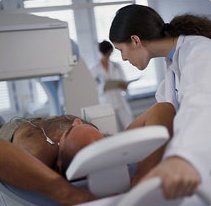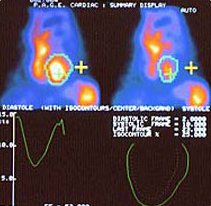Nuclear medicine techniques
Radionuclide ventriculography (sometimes known as MUGA) is a test that uses very small amounts of radioactive materials, called tracers, to make your heart and blood vessels visible. This test evaluates heart function. Perfusion scans will show the blood flow through the heart muscle and may detect areas of poor blood flow ischaemia . For both tests, tracers are injected into your vein and are tracked through the heart using special cameras or scanners.
You will usually be tested when you are resting and possibly again with exercise, or after taking certain medicines. You may be asked not to have any food or drink containing caffeine or alcohol for several hours before the tests. You should take your daily medicine, unless otherwise instructed.
Nuclear medicine techniques only carry a very low risk of complications, as the amount of radiation is so small.
 |
| © Siemens Patient having the MUGA scan |
 |
| © Texas Heart Institute Example of a MUGA scan |




















